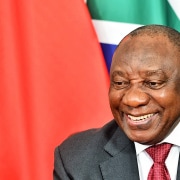|
Getting your Trinity Audio player ready...
|
President Cyril Ramaphosa’s announcement on 29 August of the appointment of members to the multi-sectoral National Anti-Corruption Advisory Council (NACAC) has been a long time coming, and represents some movement in advancing implementation of the National Anti-Corruption Strategy 2020 – 2030 (NACS), says Corruption Watch.
These representatives from academia, civil society, the private sector, and government have their work cut out for them if they are to boost public confidence in concrete efforts to reduce corruption and enhance mechanisms for transparency and accountability in the country.
The NACS was officially adopted by Cabinet on 18 November 2020. Now, almost two years later, those tasked to oversee the interim transitional implementation of the NACS can finally begin the serious business of advising on how to strengthen South Africa’s anti-corruption architecture, advance public awareness of corruption, and ensure effective implementation of the strategy. The advisory council is also responsible for bringing together all parties in a national summit that will set the country’s anti-corruption agenda and evaluate progress in rolling out the NACS.
“One understands the levels of frustration and cynicism in relation to government’s commitment to handling corruption in the country, a result of public fatigue following all the revelations at the Zondo commission without any real accountability yet,” says Karam Singh, executive director of Corruption Watch.
Many of the solutions to the country’s corruption problems can be found in the principles and objectives embedded in the NACS, and more pertinently its implementation, Singh adds. “So the appointment of this body is an important step in realising those objectives and finally seeing real change.”
Corruption Watch was an active participant over several years in the process of developing a viable anti-corruption strategy. The aim was to craft a strategy that will have legitimacy and deliver results for a country wracked by systemic corruption and scandals that have hollowed out institutions from law enforcement bodies to state-owned enterprises and other organs of state.
The organisation was able to draw from its extensive work in pushing for transparency in leadership appointments to key institutions, holding leaders to account, mobilising the public to report and stand up against corruption, and analysing data of key corruption trends and hotspots.
It is therefore gratifying that individuals associated with Corruption Watch are present on the council, albeit in their own capacity, but also as a result of their contribution to anti-corruption efforts in the country. These include Corruption Watch’s founder and former executive director David Lewis, the current head of campaigns and stakeholder relations, Kavisha Pillay, and current board member Firoz Cachalia, who is also the chair of the advisory group.
Members of the advisory council will need to engage stakeholders across all sectors of society, in line with the “whole of society” approach outlined in the NACS, and ensure that mechanisms are prioritised to raise public awareness about corruption and engage the public, as outlined in the six key pillars of the strategy.
“The collective wisdom that this team represents will play an important role in advising the president on the most appropriate anti-corruption efforts to finally turn things around in the country,” says Singh. “We need to restore public trust in the ability of committed individuals from multiple sectors to build the viable institutions to combat corruption. The establishment of the NACAC must be seen as a vehicle to take us in this direction.”
For media queries, please contact:
Oteng Makgotlwe 076 473 8336 OtengM@corruptionwatch.org.za
Phemelo Khaas 083 763 3472 phemelok@corruptionwatch.org.za








